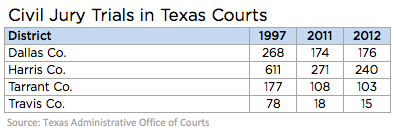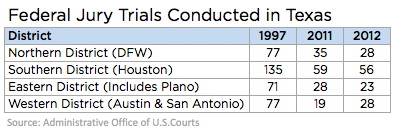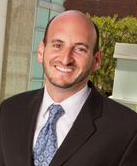© 2013 The Texas Lawbook.
By Mark Curriden
Senior Writer for The Texas Lawbook
Judge Patrick Higginbotham of the U.S. Court of Appeals for the Fifth Circuit warned a group of lawyers and federal judges in 1997 that civil jury trials were headed to extinction.

Despite the warning, most lawyers and judges scoffed. After all, no state in the country trusted citizen juries to resolve personal and business disputes more than Texas.
During the 16 years since Judge Higginbotham’s warning, civil jury trials have plummeted to historic 40 year lows.
In 2012, there were 135 civil jury trials in the federal courts in Texas – down from 360 in 1997.
The state courts have witnessed a similar decline. Last year, there were fewer than 1,200 civil jury trials in state district courts in Texas – a one percent decline from 2011 and down nearly 300 percent from 1997, when there were 3,369 jury trials.


While plaintiff’s lawyers have cried foul for more than a decade, prominent judges and lawyers representing large businesses have suddenly started sounding the alarm.
“My fear is that we are returning to the French legal system prior to the French Revolution when trials did not exist and cases were all done on paper,” says Judge Higginbotham. “The reduction in jury trials isn’t about the empty courthouse – it is about the alienation of the people from the process. The jury system is about governance.”
Legal experts agree.
“There’s this distrust of juries, which I truly don’t understand,” says Jeff Lowenstein, a partner at Dallas-based Bell Nunnally & Martin. “Nobody works harder or feels more deeply about dispensing justice than 12 of our fellow citizens.

Dan Worthington, president of the Texas Association of Defense Counsel, an organization comprised of lawyers who represent insurance companies, manufacturers and other businesses in the state, says the decline in jury trials is a “profoundly negative” trend for individuals and businesses.
“This is an unhealthy trend for those seeking justice,” says Worthington, who practices law in McAllen. “Unfortunately, I predict this trend is going to continue.”
Judge Higginbotham and others say the problem isn’t because juries are out of control and deliver unjustly verdicts.
Multiple studies have shown that Texas juries tend to be more conservative in awarding damages than citizens in other states. A 2012 study by Thomson Reuters of civil jury verdicts nationwide found that the median damage award in Texas was $12,189, making Texas juries the fourth stingiest in the country.
Worthington and legal experts say the dramatic drop in jury trials isn’t the result of fewer disputes. Instead, they say that the ability to have disputes decided by a jury has been severely curtailed by a combination of efforts during the past two decades, including tort reform and appellate court decisions, which have severely curtailed people’s abilities to have juries hear and decide their claims.
They also say that thousands of civil complaints that were once heard by juries are now resolved pretrial in mediation or have been pushed into the private world of arbitration.
Texas juries decided 12 percent fewer personal injury and medical malpractice cases, 15 percent fewer business disputes and 50 percent fewer product liability cases during the past year compared to 2011.
Statistics show that juries in 2012 sat in judgment of 800 percent fewer product liability claims, including cases of faulty medical devices, dangerous prescription drugs, defective tires and accident-prone cars than they did in 1996.
“People get very upset when other constitutional rights are taken away or limited, but we are witnessing our Seventh Amendment right to a civil jury severely attacked and people don’t seem to care,” says Joseph Ahmad, a Houston lawyer who represents businesses in employment law-related disputes.
State district judges in nearly every major metropolitan area – the exception being Dallas – conducted fewer jury trials in 2012 than they did the previous year or any of the previous 16 years, although the annual slope downward seems to be leveling out.
- Harris County District judges conducted 240 civil jury trials in 2012, an 11 percent drop from a year earlier.
- Travis County District courts recorded only 15 jury trials to verdict, a 17 percent decline.
- Tarrant County witnessed a four percent drop in 2012.
- Dallas County District judges actually conducted two more trials in 2012 (176) than they did a year earlier (174).
In 1996, Harris County juries resolved 616 civil disputes, compared to only 240 in 2012.
Victor Vital, a litigation partner at Greenberg Traurig in Dallas who represents large corporations, said the high cost of taking a lawsuit to trial has made jury trials cost prohibitive.

Vital says judges need to be more of a gatekeeper on the discovery demands of the lawyers, which he says will keep the cost of litigation lower and encourage more clients – be they individuals or businesses – to want to go to trial.
To address the issue, the Texas Supreme Court implemented its new “expedited trial” rules for cases where $100,000 or less is in dispute. The new rules limit discovery and push cases to trial quicker.
But many lawyers say the Texas appellate courts are a significant part of the problem. They say the justices have widened the “no evidence review standard” by shifting issues that were once considered questions of fact decided by juries and made them questions of law decided by judges.
“The appellate courts in Texas have become so conservative and so favoring defendants that I advise my business clients who have a rock solid case that we should file the lawsuit in another state,” says Adam Schiffer, a Houston lawyer who represents Texas businesses. In high-stakes litigation.
“I know that if I get a good jury verdict for my business clients – a verdict that is fully supported by the facts and the law – that there is a significant chance that the Texas Court of Appeals or the Texas Supreme Court is going to take it away from us,” says Schiffer.
When the Texas Supreme Court and the intermediary appellate courts reverse so many jury verdicts, the lower courts take it as a strong signal that they should be more aggressive in tossing cases before the evidence even makes it to a jury, according to legal experts.
“The Texas appellate courts have all but told trial judges that they need to grant more motions for summary judgment and let fewer cases go to trial,” says Steve McConnico, an Austin lawyer who represents large corporations in business disputes.
“We write motions for summary judgment today for our corporate clients that we would have laughed at only a few years ago,” says McConnico, whose clients include large energy and pharmaceutical companies. “The Texas Supreme Court has made proving causation and damages in all kinds of cases much more difficult.
“It is sad that this valuable and effective constitutional right is going away and people are not more outraged,” he says.
© 2013 The Texas Lawbook. Content of The Texas Lawbook is controlled and protected by specific licensing agreements with our subscribers and under federal copyright laws. Any distribution of this content without the consent of The Texas Lawbook is prohibited.
If you see any inaccuracy in any article in The Texas Lawbook, please contact us. Our goal is content that is 100% true and accurate. Thank you.
